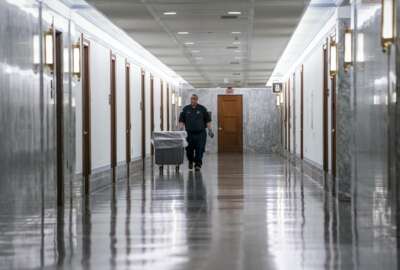
USPS sets up coronavirus supplies command center
In today's Federal Newscast, a supplies command center has been established by the Postal Service, to help its employees get masks, gloves, hand sanitizer and other...
To listen to the Federal Newscast on your phone or mobile device, subscribe in PodcastOne or Apple Podcasts. The best listening experience on desktop can be found using Chrome, Firefox or Safari.
- A supplies command center has been established by the Postal Service to help its employees get masks, gloves, hand sanitizer and other coronavirus supplies. The center will track supply inventories and help districts identify which facilities need to stock up on pandemic supplies. Facilities and employees can contact the center for help tracking orders, or for assistance in locating and ordering supplies. But USPS says facilities should still follow standard procedure and buy supplies locally whenever possible. (U.S. Postal Services)
- The White House is out with new guidance on how agencies should resume normal operations during the pandemic. The Trump administration says agencies should follow states’ leads to gradually reopen federal offices and lift mandatory telework orders. The Office of Personnel Management and Office of Management and Budget gave agencies a framework to help them make these decisions. They say agencies should allow a gating period, where states determine if it’s safe enough to reopen parts of the local economy. Then, agencies can begin to lift mandatory telework orders in phases. Federal employees at high risk for the coronavirus should continue to telework until the region returns to normal. (Federal News Network)
- Small business contractors worried about their businesses during the coronavirus pandemic can now check their credit ratings more easily. A free service from Experian lets small businesses better understand where their credit score stands and look for potential lending options should they need funding. The free credit report service is available through May 20. (BusinessWire)
- The Environmental Protection Agency expanded its research to help cope with the pandemic. EPA will publish a federal register notice this week. It seeks a rapid review by the agency’s Science Advisory Board, of the scientific agenda identified by EPA researchers. They’ve tentatively named environmental cleanup and disinfection techniques, how the coronavirus behaves in air or wastewater, and how to clean personal protective gear. Administrator Andrew Wheeler says EPA will also hold two public meetings on the revised research agenda.
- Military recruitment is officially exempt from the Pentagon’s travel lockdown. Defense Sec. Mark Esper signed a new stop movement order yesterday that extends DoD’s travel restrictions through the end of June, but makes an explicit exception for new recruits headed to basic training. Esper told the military services they must notify him before they take any actions that would reduce or suspend recruiting or basic training. (Federal News Network)
- The Air Force has signed an agreement to deploy an oral coronavirus test across its bases. The move is a coordination between the Air Force Rapid Capabilities Office, the Joint Acquisition Task Force and the Defense Health Agency as part of a $13 million research and development blanket purchase agreement. The tests are created by Curative Incorporated. The company will make 40,000 tests. The Air Force will start testing airmen in the next two weeks.
- The Defense Department is expecting a procurement slowdown due to the coronavirus. Major weapons systems will see a three month delay in procurement due to the coronavirus, according to Pentagon acquisition chief Ellen Lord. The Defense Department is currently evaluating what acquisition milestone steps will be pushed back because of impacts from the disease. DoD expects higher progress payments to go out to companies this week. The Pentagon hopes the extra cash will help key businesses in the industrial base hold on during the economic slump. (Federal News Network)
- A major milestone in the ongoing efforts to achieve interoperability between the Pentagon and Veterans Affairs has been reached. VA and DoD launched their new joint medical information exchange over the weekend. The health information exchange allows VA and DoD physicians to quickly access health records for tens of thousands of patients who see community providers. The exchange also gives community providers a single access point to request DoD and VA electronic health records. The health information exchange serves as a starting point for future interoperability expansion and VA and DoD’s shared electronic health record on the Cerner platform. (Department of Veterans Affairs)
- Veterans Affairs acquired a new hospital in Texas to bump up its capacity during the coronavirus pandemic. Baylor, Scott and White donated an unused 470,000 square foot facility to VA earlier this month. The facility will serve as an overflow inpatient facility to treat coronavirus cases at first, and then a regular veterans healthcare facility. It will later turn into a new facility to meet the demands from the region’s 184,000 veterans.
- The Defense Department is reconsidering parts of its JEDI contract award – with the backing of a federal judge who’s agreed to keep the review narrow in scope. Amazon Web Services wanted the court to order a much broader corrective action process, letting vendors revise their bids on a wide range of issues in the JEDI contract. But Judge Patricia E. Campbell-Smith says she has no authority to dictate what DoD should do under the voluntary remand process, and that it’s too early to know exactly what kinds of corrective action the department will take. Amazon’s bid protest lawsuit is on hold for the next 120 days, or until the reconsideration process is finished.
- The Justice Department’s $4.5 billion multiple award IT services contract will take just a little bit longer. Justice lost a protest of the unrestricted portion of the ITSS-5 vehicle when the Government Accountability Office ruled in favor of MetroStar. MetroStar’s complaint. Metrostar claimed Justice misevaluated its proposal as well as those of the eventual winners leading to the company being left out of the awards. ITSS-5 has been in the works since September 2017.
- A new decision from the Federal Service Impasses Panel ruled on the ongoing collective bargaining dispute between the Social Security Administration and the Association of Administrative Law Judges. The panel cut official time for the judges from over 14,000 hours a year to 1,200 hours a year, and left it up to SSA to determine whether they can telework. The panel also left it up to SSA to determine whether ALJs can telework. But the agency can’t prohibit telework depending on an individual judge’s performance. (Federal News Network)
- The State Department is taking steps to cross cyber workforce issues off its to-do list. The Government Accountability Office says the agency is reviewing its IT management occupational series to make sure that those in IT, cyber and cyber-related positions are handling their own specific workloads. GAO also recommends that State show how its cyber risk management and enterprise risk management teams are working together.
- Two big chairs in the federal CIO community are being shuffled. John Sherman, the chief information officer for the intelligence community, is leaving after two-and-a-half years, but he isn’t going far. Sherman is joining the Defense Department to be its principal deputy CIO, replacing Essye Miller, who is retiring in June. He comes to DoD after spending his entire 20-plus year career in the intelligence community working for several agencies, including the CIA and NGA. Miller leaves DoD after 35 years of federal service. She started as an intern in 1985 for the Air Force and worked her way up the IT career ladder holding positions such as acting DoD CIO and the director of cybersecurity for the Army CIO/G-6. (Federal News Network)
Copyright © 2025 Federal News Network. All rights reserved. This website is not intended for users located within the European Economic Area.
Eric White
Eric White is news anchor and Federal Drive producer at Federal News Network.
Follow @FEDERALNEWSCAST
Related Stories
Related Topics
All News
Amazon Web Services
Association of Administrative Law Judges
Covid-19
Ellen Lord
Environmental Protection Agency
Federal Drive
Federal Newscast
Federal Service Impasses Panel
Government Accountability Office
Health News
JEDI
John Sherman
Justice Department
Management
MetroStar
National & World Headlines
Postal Service
Social Security Administration
State Department
telework
Workforce




